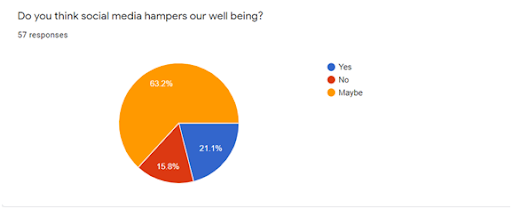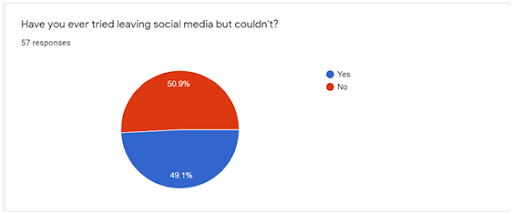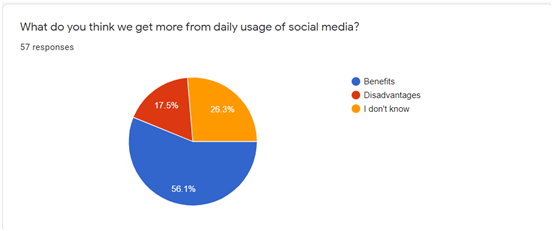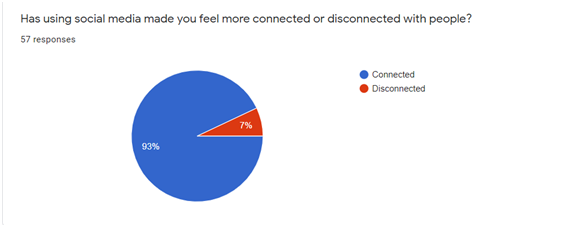Through this survey, we have come to know that social media can be a great platform for networking. It can be used largely to obtain knowledge and to be informed about the environment.
A couple of weeks ago, I went to Google forms and sent out a survey to people connected to my social media. These people were plus two students, bachelor’s and master’s level students and some were jobholders. The age of the people that took part in this survey is 16 to 28. I wanted the data to originate explicitly from the youths. At the end of two weeks, which was the duration, as many as 57 people answered the survey.
I asked six questions about the usage of social media. Two questions asked participants to type a precise answer on why do they use social media and which medium do they use to interact with the digital world. The remaining four questions were Multiple Choice Questions (MCQs). I will list out the MCQs later in the article. Let’s break down the answers to the first couple of questions.
The first question that I asked was, “Why do you use social media?” And each answer was beyond my expectation. A total number of 12 people admitted they used it for just entertainment. Without a doubt, the fast and attractive flowing of content in social media boosts dopamine and provides an emotion of entertainment. On the contrary, 19 people admitted they use it to stay updated on their environment; the news, and information. I think we are past the phase where people used to open television for news. Now news is available at the touch of our fingers. The other reason in which 15 participants agreed was to connect with people. They mentioned staying in digital proximity with their family, friends, colleagues, and other people they consider vital in their lives. Such reason is indisputable as social media was created in the first place to address this opportunity. Apart from these main reasons, six people admitted they use it for work/study. And two people said they use it only to pass the time.
Now, onto the second question. The question was, “Which social media do you use the most and why?” The answers didn’t surprise me in this one, as the majority came in the favor of Facebook and Instagram, the two most popular media among young people. 20 people said they use Facebook, mostly because of the content, videos, and to stay in touch with people they know. Facebook has varied options and totally depends on the smartness of the user’s usage. Some people use it to destroy their lives by watching needless content, while some look for opportunities and information to grow themselves. Similarly, 14 people admitted to using Instagram more than anything else. The reasons are largely in the favor of the particular contents in the app. According to the participants, the contents in Instagram are diverse, entertaining, and informative. And the third favorite media was YouTube, which nine people voted as the app they love. The answers were a summary of how one finds things of their interest, hobbies, and also tons of information. (And also for listening to songs). The other less voted media were Tiktok (4 users), Whatsapp (5 users), and one each for Linkedin, Snapchat, Twitter, Clubhouse, and Viber.
NRB to promote digital platforms for cross-border payment settl...

The remaining four questionnaires were MCQ. The first question asked was “Do you think social media hampers our wellbeing?” The chart below was the result of the question.

The amount of people that chose the side of indifference is large. 63.2% of people have opted for maybe. 21.1% agree that social media hampers our well-being. Whereas, 15.8% of people believe social media doesn’t invite adversities.
The next question was “Have you ever tried leaving social media but couldn’t?” And people responded in the following approach:

As many as 28 people i.e. 49.1% admitted that they have thought about leaving social media i. And 29 people i.e. 50.9% have never thought of leaving sight of social media.
The third question was “What do you think we get from the daily usage of social media?” This was the response:

As much as 56.1% think that we get benefits from social media. These benefits might include; information, communication, and attractive content whereas indifferent people are in the numbers of 26.3%. Also, 17.5% of people agree that social media brings adversities.
The final question I presented among the participants was “Has using social media made you feel more connected or disconnected with people?” Here is the chart of that particular answer:

This was a one-sided game. A small margin of seven percent of people said that with the emergence of digital media they have lost touch with the real world. On the contrary, 93% agreed mutually that social media has connected them with the world.
With this evidence, we can sturdily agree that the concept of social media is itself not bad. But it all comes down to the way one chooses to use it. People who use it for news/information have largely benefitted from it. Some choose to interact with people and enjoy the peculiarity of the contents present there. The mindless scrolling, the spread of hoax, online abuse, and interacting with avoidable scenarios can hamper the user. Using it mainly for unspeakable reasons can degrade the reputation of the media. Individuals have to be sensitive regarding other people’s sentiments who are connected in this digital platform. If one uses it to absorb the state of the world, to connect with loved ones, to enhance their knowledge, and for study/job purposes then that would be a step to make this digital platform a better place.
Through this survey, we have come to know that social media can be a great platform for networking. It can be used largely to obtain knowledge and to be informed about the environment. Evidently, one can showcase their skills on the platform. Social media is a great platform if we are willing to use it right. But it can be a great adversity if misused. So, which side are you on? Monitor and keep track of your social media habits, and decide for yourself.



































